Andrew Adamson Chronicles of Narnia Prince Caspian Interview
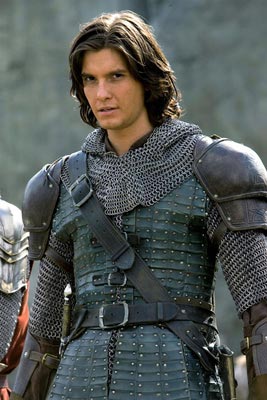
ADAMSON HEADS BACK TO NARNIA.
EXCLUSIVE Interview by Paul Fischer.New Zealand director Andrew Adamson achieved his initial success as director of not one but two Shrek films, but truly came into his own helming the hugely successful and visually audacious first chapter in Chronicles of Narnia: The Lion, The Witch and the Wardrobe. Now Adamson returnsd to the director's chair on the more complex Prince Caspian. The director discussed the challenges of bringing this book to cinematic life with Paul Fischer.
Paul Fischer: Right. When you started this quest to bring Narnia to the big screen, with Lion the Witch, did you always envision that you would do the next one, or did it take some convincing to do that?
Andrew Adamson: No, I always contemplated that I might. I think towards the end of the last one I thought there was, but didn't really, more as a responsibility for the kids and in talking to the audience during the last production, I felt there was a pretty likely occurrence that I would. With her, she was eight years old when I started the first film. I wasn't quite ready for my kids to be grown up and handed off to someone else.
Paul Fischer: In terms of the books, was Caspian always the logical successor to Lion, the Witch?
Andrew Adamson: It is likely, because of the age of the children. It is the one he wrote next. I think he wrote Horse and His Boy, actually, the fourth one, but chronologically it happens during the reign of High King Peter, and so on. He reordered them according to a letter that a kid had written to CS Lewis. But we always contemplated making them in this order.
Paul Fischer: What was the different challenge in adapting this book to the screen as opposed to the first one?
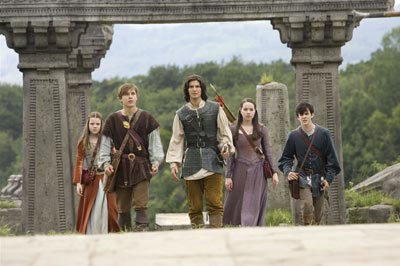 Andrew Adamson: This book is not as cinematic in its structure and writing. You know, the last one was pretty much a finite structure that we could sort of work into three-act structure. This one was , a lot of it was told in retrospect. The beginning of the film starts with the Pevensies, then you meet Trumpkin, and Trumpkin spends 40 minutes or so of film time, you know, telling the Pevensies what happened with Caspian. And in the meantime, Caspian is just kind of away in the background fighting against Miraz and Little [INAUD]. So it was more difficult to kind of figure out how to make that visceral and more of a linear experience, and not have so much exposition told off screen. So it sent us in the direction of the three faceted story, or stories that we've filmed together.
Andrew Adamson: This book is not as cinematic in its structure and writing. You know, the last one was pretty much a finite structure that we could sort of work into three-act structure. This one was , a lot of it was told in retrospect. The beginning of the film starts with the Pevensies, then you meet Trumpkin, and Trumpkin spends 40 minutes or so of film time, you know, telling the Pevensies what happened with Caspian. And in the meantime, Caspian is just kind of away in the background fighting against Miraz and Little [INAUD]. So it was more difficult to kind of figure out how to make that visceral and more of a linear experience, and not have so much exposition told off screen. So it sent us in the direction of the three faceted story, or stories that we've filmed together.Paul Fischer: Is it a responsibility for you as a screenwriter as well as a director to be cognizant of the fans of these books in doing an adaptation?
Andrew Adamson: It's not a difficult responsibility because I was a fan and am a fan of the books. So in some degree I've always been respectful enough of this material that I want to be true to it thematically, tonally, and in terms of the major, memorable events. That being said, you know, I obviously have no problem going off book at times and, you know, little things as much as, I think in the book, Reepicheep mentions the idea that they should just attack Miraz's castle. Well that I think gave me license to create a whole sequence in which they do attack Miraz's castle. But I've always tried to find something within the book and draw something from it and make sure it still feels like it belongs in the world and the story.
Paul Fischer: Were you also aware of the technological advances between the two movies? Because it seems like there's an awful lot more of that in this film than there was in Lion, the Witch?
Andrew Adamson: Well, certainly I stay very attuned to what was happening and then also just looked to try and push the boundaries a little bit as you always do. I mean, to me the biggest advantages or advantage, I should say, is obviously with the River God and what we're able to do with scanline effects with that simulation. That was a very difficult thing to achieve. In addition, although I was very happy with where we go with Aslan and I thought he was very photo real and the wolf and so on were very photo real, to the point where we went from a real wolf to a CG wolf and nobody would no. So you sort of think, well where can I go further? To me this time it was about interaction with the characters. You know, being able to have Lucy roll around playing with Aslan, and to have her hands in his mane, those kinds of things are very difficult to achieve, that actually buy you this believability that we didn't quite get to maybe in the same way last time. So it's sort of being aware of those things helps you to tell the story much better.
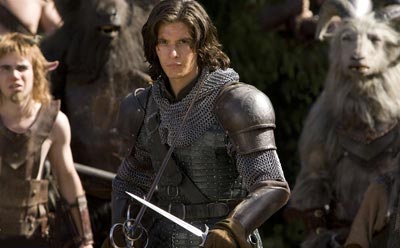 Paul Fischer: How do you decide on the casting of this film? The villains and of course Caspian?
Paul Fischer: How do you decide on the casting of this film? The villains and of course Caspian?Andrew Adamson: At a certain point I decided that I wanted the Telmarines to be of sort of Mediterranean, they come from pirates that seemed to be in the direction of how much of the piracy happened in the Mediterranean area, and you know how probably their biggest fear was the conquistadors, and how would that influence their way of being. That really just led me to looking at casting sort of internationally, and in Latin speaking countries, and that led me in the direction of wanting Caspian to be very different than Peter. Although they go hand in hand, I wanted Peter to be very different and Caspian to be something else, so there was a definite contrast there.
Paul Fischer: How did he come up with Ben Barnes?
Andrew Adamson: Gail [Stevens], our casting director saw him onstage in History Boys in London, and she was very taken with him, thought he looked great and thought his performance was really good, and got him to put himself on tape. Turned out he was a huge fan of all of the books but was really excited about playing the role. We met in LA, we both flew to LA and met there. I just was very taken with him both in terms of what he got from the character and the performance, and then just who he is as a person.
Paul Fischer: Have you noticed how much the four kids had evolved as actors since the first time you worked with them?
Andrew Adamson: I think they've all grown really well, both physically and in terms of who they are as people. I think in terms of their performances, I'm particularly proud of Will in this film. I mean, I'm proud of them all but I think Will [Moseley] is somebody that's grown so much. He'd never done anything before the first film, and I think he really holds his own in this film, both in an action sense and also in the weight that he has to carry as, you know, a character that's sort of getting off on his own ego, to the point of ultimately letting go and handing over his kingdom to somebody else. That's a big emotional curve for a character to carry and I think he does it very well. But I think, you know, Skandar [Keynes] as well, Skandar has gone from being a little boy in the last film to being this really smart, intelligent young man who comes across as really sort of shrewd and clever and capable in this film. So, I think they've all grown really well. Anna [Popplewell] kicks butt. She's gone from being this little schoolgirl to being this warrior Princess. And then, you know, Georgie [Henley] I just think is like, has just continued to grow as a character and a person.
Paul Fischer: When I was at Sundance I spoke to Tilda [Swinton], and I asked her if she was going to be in this movie, and she said she died in the last one. So she was either and extremely good liar-and I will get back to her the next time I see her---
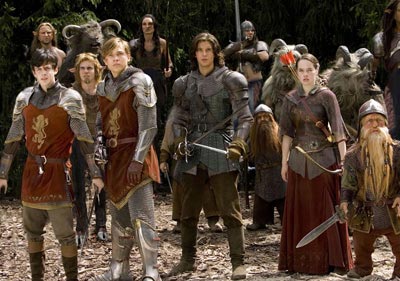 Andrew Adamson: She is going to kill me! We talked about this. We had this whole idea that the White Witch was going to be a surprise, I didn't want the audience to know. I thought we were going to be doing the big thing with the Brits, OK, no spoilers on the White Witch and we'll keep her as a surprise. And we get to the point we're marketing the film and Disney marketing guys go, you have to let us show the White Witch. We've just found that the audience really wants to see her again, they loved her from the last film. So I reluctantly agreed, forgetting the fact that I'd asked Tilda not to tell anyone she was in the film. So yeah, she's going to kill me for that I think.
Andrew Adamson: She is going to kill me! We talked about this. We had this whole idea that the White Witch was going to be a surprise, I didn't want the audience to know. I thought we were going to be doing the big thing with the Brits, OK, no spoilers on the White Witch and we'll keep her as a surprise. And we get to the point we're marketing the film and Disney marketing guys go, you have to let us show the White Witch. We've just found that the audience really wants to see her again, they loved her from the last film. So I reluctantly agreed, forgetting the fact that I'd asked Tilda not to tell anyone she was in the film. So yeah, she's going to kill me for that I think.Paul Fischer: How do you think you have gone, the filmmaker from Shrek to this? Are you aware of your growth as a director?
Andrew Adamson: You know, I think you always try and improve on what you did last. In some ways In some ways I see some really strong parallels between Shrek 1 and Shrek 2, going from this very simple naïve film to something that's much more complex on a character level, it being a similar parallel here. I think the last film was a little more pure, simplistic and symbolic, and I think this film is working on a more complex character level, and certainly logistically more complex. And probably larger.
Paul Fischer: In the last one you were plagued with all this press about the film's religious persuasion, rightly or wrongly. Are you relived in a way that that kind of subtext is not going to be as prevalent this time around?
Andrew Adamson: Certainly. I mean, the last one was dealing with the resurrection story, I know we dealt with that last time, and what are the consequences of dealing with that particular story, which is existent in so many different cultures and religions. But certainly it became a more pressing issue in the US, more so than anywhere else, I have to say. I certainly didn't deal with a lot of press on that anywhere else. But I think, you know, CS Lewis never had intended for it to be allegorical, although it's influences by his beliefs and a lot of people take it as pure allegory. Although I do not think it was intended to be, so. This film is a victim of that same allegorical reference if you want to put it that way. I think the last film spoke for itself in that it succeeded with a secular and nonsecular audience. I think and hope this film will as well.
Paul Fischer: As a director, do you think you've put the Chronicle of Narnia behind you after this film, or will you return to these stories?
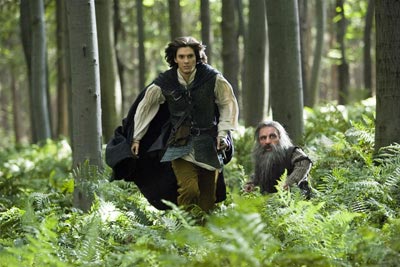 Andrew Adamson: Well, I'll stay involved in them but as a director I think I've got other things I want to achieve. I could make Shrek movies and Narnia movies the rest of my life, but I want to take time off and think about something different to do next.
Andrew Adamson: Well, I'll stay involved in them but as a director I think I've got other things I want to achieve. I could make Shrek movies and Narnia movies the rest of my life, but I want to take time off and think about something different to do next.Paul Fischer: Any ideas?
Andrew Adamson: Yeah, no, there's little stuff that's bubbling away, but I'm going to just take some time to see what bubbles to the surface. But it's going to be something a lot smaller.
Paul Fischer: Do you enjoy working in New Zealand?
Andrew Adamson: I do. I find the crews there really great. My kids are now, my oldest daughter is at school age so some degree I want to give her a chance to be somewhat stable for a little while, so there's a lot of good reasons to work there. On the other hand, it depends really on what surfaces and where I need to make it.
Paul Fischer: How nervous are you about this movie opening during, another tent pole summer film for Disney?
Andrew Adamson: It's a big summer this summer. I think there's some really good films out there. I'm obviously, I think it's better for all of us. You never know how much the films are cannibalizing on the box office. But I feel pretty strongly about the film. I think, so far the feedback I've got is that it's a better film than the last one and I hope that's true. Talking about growing as a filmmaker, that's what you always hope. But, you know, only time will tell, really.
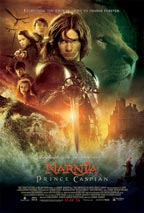
The Chronicles of Narnia: Prince Caspian
Starring: Ben Barnes, Skandar Keynes, William Moseley, Anna Popplewell, Georgie HenleyDirector: Andrew Adamson
Screenwriter: Andrew Adamson, Christopher Markus, Stephen McFeely
Producer: Andrew Adamson, Mark Johnson, Philip Steuer
Composer: Harry Gregson-Williams
Genre: Science-Fiction/Fantasy
The characters of C.S. Lewis's timeless fantasy come to life once again in this newest installment of the "Chronicles of Narnia" series, in which the Pevensie siblings are magically transported back from England to the world of Narnia, where a thrilling, perilous new adventure and an even greater test of their faith and courage awaits them. One year after the incredible events of "The Lion, the Witch and the Wardrobe," the Kings and Queens of Narnia find themselves back in that faraway wondrous realm, only to discover that more than 1300 years have passed in Narnian time. During their absence, the Golden Age of Narnia has become extinct, Narnia has been conquered by the Telmarines and is now under the control of the evil King Miraz, who rules the land without mercy.
The four children will soon meet an intriguing new character: Narnia's rightful heir to the throne, the young Prince Caspian, who has been forced into hiding as his uncle Miraz plots to kill him in order to place his own newborn son on the throne. With the help of the kindly dwarf, a courageous talking mouse named Reepicheep, a badger named Trufflehunter and a Black Dwarf, Nikabrik, the Narnians, led by the mighty knights Peter and Caspian, embark on a remarkable journey to find Aslan, rescue Narnia from Miraz's tyrannical hold, and restore magic and glory to the land.
MORE
- Viggo Mortensen The Road
- 24 Cast Reunion
- Aaron Eckhardt No Reservations
- Aaron Eckhart The Dark Knight
- Adam McKay Step Brothers Interview
- Alan Alda Diminished Capacity Interview
- Alan Alda Diminished Capacity Interview
- Alex Dimitriades
- Al Pacino Oceans 13
- Alan Rickman Snow Cake
- Alan Rickman Sweeney Todd
Copyright © 2001 - Female.com.au, a Trillion.com Company - All rights reserved. 6-8 East Concourse, Beaumaris, Vic 3193, Australia.



